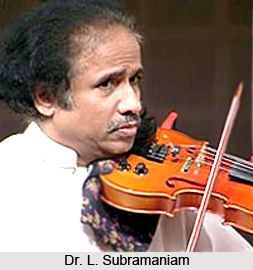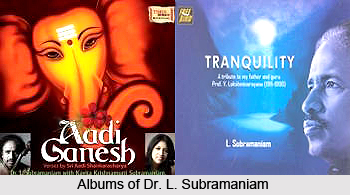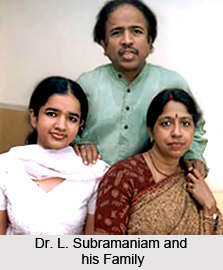 L Subramaniam is properly known as Lakshminarayana Subramaniam. He is a renowned character of Indian music. He is an applauded Indian violinist, composer and performer, trained in the classical Carnatic music and Western classical music. Dr L Subramaniam was born into a Tamil musical family and gave his first public performance at the tender age of six. Both his father, V. Lakshminarayana and his mother V. Seethalakshmi were accomplished musicians. Passionate about music, Subramaniam was also dedicated to Science. He studied medicine, after doing M.B.B.S at Madras Medical College and registered as a General Practitioner.
L Subramaniam is properly known as Lakshminarayana Subramaniam. He is a renowned character of Indian music. He is an applauded Indian violinist, composer and performer, trained in the classical Carnatic music and Western classical music. Dr L Subramaniam was born into a Tamil musical family and gave his first public performance at the tender age of six. Both his father, V. Lakshminarayana and his mother V. Seethalakshmi were accomplished musicians. Passionate about music, Subramaniam was also dedicated to Science. He studied medicine, after doing M.B.B.S at Madras Medical College and registered as a General Practitioner.
Career of L Subramaniam
Since 1973, around 200 recordings are there in the credit of L Subramaniam. He has experimented with new concepts and different ideas because of his stable foundation in Carnatic Classical, Western Music, Orchestration and rhythm. He has accompanied some of the most famous names in Carnatic music such as Chembai Vaidyanatha Bhagavatar, M. D. Ramanathan, among others. He has performed many concerts with the venerable Palghat Mani Iyer on the Mridanga, in addition to collaborating with other South Asian artists. Creations with orchestras include `Fantasy on Vedic Chant` with the New York Philharmonic and Zubin Mehta, `Turbulence` with the The Swiss Romande Orchestra, `The Concert of Two Violins` with The Oslo Philharmonic, and `Global Symphony with the The Berlin Opera among others. His compositions have also been used in various stage presentations by leading ballet companies, including the Cleveland San Jose Ballet Company and the Alvin Ailey Company. He is the creator of the Global Music concept.
 He launched his album titled `Global Fusion` featuring artists from five continents including one of the most popular and successful singers in the film industry, wife Kavita Krishnamurthy and his talented and versatile daughter Seetaa Subramaniam.
He launched his album titled `Global Fusion` featuring artists from five continents including one of the most popular and successful singers in the film industry, wife Kavita Krishnamurthy and his talented and versatile daughter Seetaa Subramaniam.
He has composed music for the films such as Salaam Bombay (1988) and Mississippi Masala (1991) directed by Mira Nair, in addition to being the featured violin soloist in Bernardo Bertolucci`s Little Buddha (1993) and Cotton Mary (1999) of Merchant-Ivory productions.
Subramaniam has written works for orchestras and Hollywood film scores, and written books on Carnatic music. To increase understanding of the concepts of South Indian Classical Music, he has released a four-CD set, called "An Anthology of South Indian Music" and written an authoritative book "Euphony".
 Awards and recognitions of L. Subramaniam
Awards and recognitions of L. Subramaniam
He has received several awards and honours. He received "Sangeet Natak Akademi Award" for "The Most Creative Artist" from the President of India. He has been awarded the "Nada Chakravarti" the Emperor of Sound from H.H Sri Ganapati Sachchidananda Swami-ji at Trinidad, West Indies. In recognition of his contribution to the World of Music, he has been conferred with Honorary Doctorate (D.Lit) by both Bangalore University and University of Madras. He was awarded the Padma Shri in 1988 and Padma Bhushan in 2001. To honour the memory of 100 years of the Nobel Peace Prize, an album has been released bringing together the best from music and excerpts from speeches of Nobel laureates. For this project featuring artists from all around the world, Dr Subramaniam and Kavita Krishnamurthy Subramaniam were chosen to represent the Asian continent. He received a Grammy nomination in 1981.
Personal Life of L. Subramaniam
L Subramaniam was married to Viji Subramanian, who was a Carnatic music singer but she passed away on February 9, 1995. He is now married to the popular Indian playback singer Kavita Krishnamoorthy (Nov 1999). His brother is also a well known and acclaimed violinist L. Shankar.
Today, he is the founder and director of the "Lakshminarayana Global Music Festival". It is held annually, primarily in India, but has also been held in different parts of the world. It is the biggest global music festival in India, in which the spirit of confrontation is strongly expressed.




















